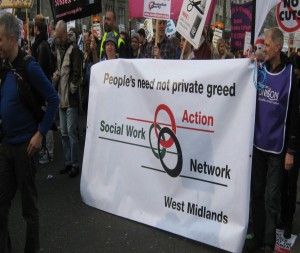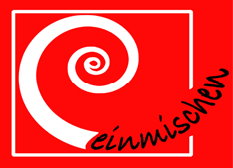Interessant ist auch der Blick was in anderen Ländern im Themenfeld „kritische Soziale Arbeit“ (engl. eher „radical social work“) passiert. In Großbritannien existiert das „Social Work Action Network“ (SWAN) in dem SozialarbeiterInnen sich organisieren. Das Netzwerk kooperiert mit Gewerkschaften. Die Lage der Sozialen Arbeit dürfte z.T. sehr ähnlich sein und könnte (Ähnlichkeiten betreffend) vielleicht mit folgenden Schlagworten umschrieben werden:
„Managerialism“, „consumers“ statt „clients“, „Skandale“ um verstorbene Kinder („Baby P“), Personalisierung und Budgetisierung von „Dienstleistungen“, zunehmende Privatisierungen um sozialen Bereich, Kürzungen (vermutlich wesentlich massiver als in Deutschland), Ausrichtung der Sozialen Arbeit nach „Disziplinierung und Kontrolle“ als Problemlösungsstrategie (da Soziale Probleme individualisiert werden, vgl. z.B. „Die Unruhen in den britischen Städten gingen von antisozialen Menschen aus“: http://www.heise.de/tp/artikel/35/35881/1.html).
Doch auch in Deutschland tut sich Einiges. In immer mehr Städten existieren Arbeitskreise kritischer Sozialer Arbeit und auch das unabhängige Forum ist sehr aktiv vgl. z.B. http://sozialearbeit.einmischen.info/

Ein Blick auf die Mitgliedssatzung des Netzwerkes (mehr unter http://www.socialworkfuture.org/) verrät ein wenig über Struktur und Inhalt:
1. SWAN – What we stand for.
The Social Work Action Network (SWAN) is a radical, campaigning organisation of social work and social care practitioners, students, service users, carers and academics, united by our concern that social work practice is being undermined by managerialism and marketisation, by the stigmatisation of service users and by welfare cuts and restrictions. While recognizing that social work is one of the mechanisms through which the State controls the behaviours of poor families, we believe nevertheless that social work is a valuable activity which can help people address the problems and difficulties in their lives. Many of these difficulties are rooted in the inequalities and oppressions of the modern world and good social work necessarily involves confronting the structural and public causes of so many private ills.
2. Aims and Objectives.
i) To promote a model of social work practice which is rooted in the value of social justice, which seeks to advocate alongside, and on behalf of, carers and service users and which values both individual relationship-based practice and also collective approaches;
ii) To challenge the domination of social work and social care services by managerialist perspectives and practices which prioritise budgets, targets and outcomes over the needs of the people who use these services;
iii) To bring together practitioners, students, carers, service users and academics through regular conferences and campaigning activities in support of the above objectives, and to strengthen the radical voice within social work practice, education and wider social policy debates;
iv) To work alongside existing social work, social care and carer and service user organisations, including UNISON and BASW, to promote strong collective organisation and, wherever possible, to campaign jointly around specific issues.
3. Membership
Membership of SWAN shall be open to social work and social care students, academics, carers and service users, and to anyone working in the field of social work and social care who supports the aims of SWAN (as outlined in section 2 above) and who pays an annual membership fee to be agreed at annual conference.
The annual fee shall be agreed each year at national conference. For the period September 2009 to September 2010 the membership fee is £10. The fee for students and service users is £5. Asylum seekers are eligible to free membership.
4. SWAN structure and organization
SWAN is a democratic, grass-roots, membership-controlled organization, which aims to support and promote both local and national initiatives, in line with SWAN’s aims as outlined in section 2 above. As a matter of both principle and resource considerations, any additional layers of organization should be kept to a minimum.
SWAN is committed to the principles of anti-oppressive social work and, therefore, membership of far-right, Nazi organizations like the BNP is incompatible with membership of SWAN.
5. Conference
i) Annual conference is the sovereign body of SWAN, where policies are debated and agreed upon, and where elections take place.
ii) A national steering committee of 12 people will be elected each year by SWAN Supporters at conference and will be accountable to conference.
(…)


